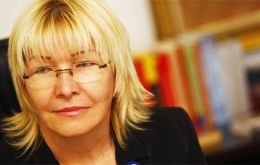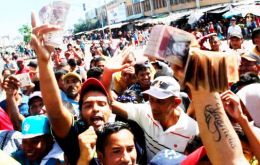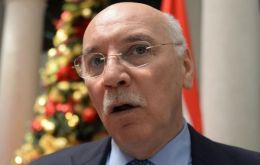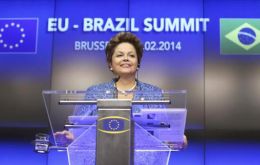MercoPress. South Atlantic News Agency
Tag: Venezuela crisis
-
Saturday, April 1st 2017 - 09:09 UTC
Chavism divided: Chief prosecutor says there has been a ”rupture of constitutional order

Venezuela's chief prosecutor broke with the government on Friday and rebuked a Supreme Court decision stripping Congress of its last vestiges of power, showing a crack in the unity of the embattled populist government of President Nicolas Maduro as it came under a torrent of international condemnation over what many decried as a major step toward dictatorship.
-
Monday, December 19th 2016 - 09:55 UTC
Maduro backtracks on elimination of 100-bolivar bill as looting erupts

Venezuela's President Nicolas Maduro reversed his decision to ban from circulation the 100-bolivar bill and gave the notes, which are worth between US$ 0.02 and 0.04 according to varying quotations, a two-week grace. The bills can now be used until January 2, Maduro said.
-
Monday, May 30th 2016 - 07:36 UTC
Venezuela's public sector will only work Mondays and Tuesdays for another two weeks

Venezuela's government on Saturday extended by two weeks a decree reducing the public sector workweek to Mondays and Tuesdays in a bid to tackle the oil-rich country's electricity crisis. The enforced leave was first announced in late April, a drastic move for a government also grappling with an economic crisis that has Venezuelans queuing for hours to buy scarce supplies.
-
Friday, May 27th 2016 - 08:04 UTC
Paraguay requests meeting of Mercosur foreign ministers to address Venezuela situation

Paraguay formally requested on Thursday a meeting of Mercosur foreign ministers to address the situation in Venezuela which is undergoing a critical political, social and economic scenario. The request was presented to Uruguay which currently holds the chair of the trade block made up of Argentina, Brazil, Paraguay, Uruguay and Venezuela.
-
Saturday, March 8th 2014 - 06:32 UTC
Unasur meets to address the Venezuelan situation next Tuesday in Chile

Latin American foreign ministers and most probably presidents, will meet next week to discuss the unrest in Venezuela that has left at least 21 dead and hundreds injured and arrested following weeks of protests and clashes, according to the Ecuadorean president Rafael Correa.
-
Wednesday, February 26th 2014 - 07:10 UTC
Paraguay will chair Mercosur in the next six months, says Dilma Rousseff

Paraguay will hold the following rotating chair of Mercosur, (if the group's summit to be hosted by Venezuela and which has been delayed on several occasions really takes place). The announcement was made by Brazilian president Dilma Rousseff during her visit on Monday to Brussels for the Brazil/EU summit, who underlined that Brazil supports dialogue as the way out to the current situation in Venezuela.
